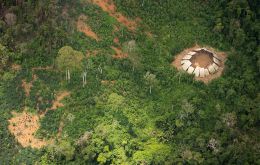MercoPress. South Atlantic News Agency
Environment
-
Monday, February 20th 2023 - 10:13 UTC
Brazil's Finance Minister to discuss climate change one-on-one

As he prepares to leave for Bangalore, India, this week to attend a G20 conference of economy ministers ahead of the summit of heads of government and state, Brazil's Fernando Haddad insisted that the largest South American country intends to be active again in the solution of global crises, Agencia Brasil reported. The Finance Minister also said he believed socio-environmental sustainability should be a topic in all his bilateral meetings.
-
Saturday, February 18th 2023 - 10:16 UTC
Survival: Trio rescued after 13 days trapped in rubble

Three people, including a child, were found alive under rubble Saturday in Turkey's southern Hatay province, 13 days after the earthquake that struck Turkey and Syria on Feb. 6, local media reported.
-
Friday, February 17th 2023 - 09:22 UTC
Lula, von der Leyen discuss Mercosur deal and deforestation

Brazilian President Luiz Inácio Lula Da Silva discussed Thursday the Mercosur agreement with European Union (EU) President Ursula von der Leyen in a telephone conversation during which both leaders also reviewed the South American country's fight against deforestation, it was reported.
-
Friday, February 17th 2023 - 09:06 UTC
Amount of US contribution to Amazon Fund to be announced shortly
![“In the coming weeks, that figure [of the US donation] will be released,” Ambassador Bagley said](/data/cache/noticias/93043/260x165/amazonia.jpg)
The US administration of President Joseph Biden is to define in the next few weeks its contribution to Brazil's Amazon Fund, according to Ambassador Elizabeth Frawley Bagley.
-
Thursday, February 16th 2023 - 20:54 UTC
Ecuador and Peru fighting a losing battle with China on giant squid fishing in the southeast Pacific

Giant squid, squid or Dosidicus gigas, measures up to 3 meters in length and can reach 50 kilos in weight. It is one of the main species of the southeastern Pacific Ocean and at the same time it is one of the species with the greatest commercial pressure in the world. Thousands of tons are extracted every month, a large part, from the international waters located off the seas of Ecuador, Peru and Chile. The main player behind that voracious appetite is China: it has a declared fleet of 671 ships.
-
Wednesday, February 15th 2023 - 09:57 UTC
Europe bans sales of fossil fuel-powered cars as of 2035

The European Parliament approved the draft regulation ending the sale of new petrol- and diesel-powered vehicles by 2035, it was reported Tuesday. The measure was passed by 340 votes in favor, 279 against, and 21 abstentions.
-
Sunday, February 12th 2023 - 13:24 UTC
Brazil: Monitoring flight spots lost tribe in the middle of Yanomami lands

A small indigenous community has been detected inside the Yanomami Territory in Roraima, only 15 kilometers from an illegal mining site where garimpeiros pose a threat to their survival and well-being, Agencia Brasil reported Friday.
-
Thursday, February 9th 2023 - 10:55 UTC
Evacuations ordered in Chile as wildfires run amok

Chile's National Service for Disaster Prevention and Response (Senapred) Wednesday ordered the evacuation of 14 communes in the regions of Ñuble, Biobío, and La Araucanía, including Nacimiento, Purén, and Contulmo, which have all been particularly affected by the forest fires.
-
Thursday, February 9th 2023 - 10:18 UTC
Falklands Environment Strategy: First Progress Report available online

Following the adoption of the Falkland Islands Environment Strategy 2021 – 2040 by the Executive Council in late 2021, there has been much work across government towards achieving the Vision of the Strategy. The first progress report for 2022 has been released and is available on the FIG Environment Department website.
-
Wednesday, February 8th 2023 - 08:24 UTC
Death toll crosses 8,100 threshold in Turkish/Syrian quakes

The latest reports from Türkiye and Syria two days after the series of earthquakes and aftershocks that hit the region mention at least 8,100 people confirmed dead as hopes of finding any new survivors under the rubble of collapsed buildings are turning slimmer by the minute.
